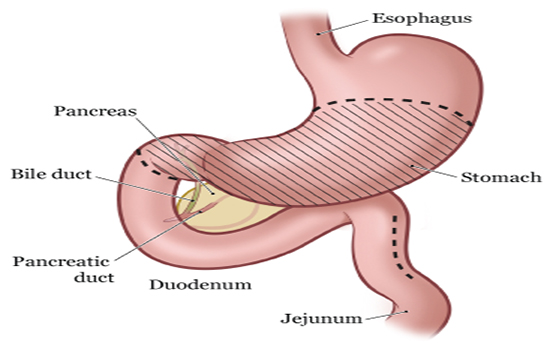best gastro surgeon In Delhi
What is Gastrectomy?
Gastrectomy is the surgical removal of all or part of the stomach. Dr. Sukhvinder Singh Saggu is one of the best doctor for Laparoscopic Gastrectomy in Delhi.

What are the indications for Gastrectomy?
Gastrectomy may be used to treat:
- Cancer of the esophagus
- Non Cancerous tumors.
- Bleeding ulcers.
- Inflammation.
- Perforation of the stomach wall
- Polyps, severe peptic or duodenal ulcers
- Obesity that is severe and life-threatening.
Types of gastrectomy
Gastrectomy may be classified into three categories.
Partial gastrectomy
During a partial gastrectomy, the surgeon will remove the lower half of your stomach. They may also remove nearby lymph nodes if they contain cancer cells.
The surgeon will close off your duodenum during this surgery. The duodenum is the first part of the small intestine to receive partially digested food from the stomach. The remaining PART of your stomach will then be linked to your bowel.
Complete gastrectomy
This procedure, also known as total gastrectomy, completely removes the stomach. Your esophagus will be connected directly to your small intestine by your surgeon. Normally, the esophagus links your throat to your stomach.
During a sleeve gastrectomy, up to three-quarters of your stomach may be removed. Your surgeon will trim the side of your stomach to turn it into a tube shape. As a result, the stomach becomes smaller and longer.
How is a gastrectomy performed?
What is the recovery time for Gastrectomy ?
The length of your recovery following a gastrectomy will be determined by the extent of the procedure. Typically, a hospital stay of 6-12 days is required. A nasogastric tube (NG tube) may be inserted via your nose and into your stomach/intestine to empty stomach contents. You may need nutrition administered through an intravenous (IV) line or a feeding tube. For a short while, you may need a bladder catheter to empty your bladder. Your doctor will remove the tubes and change your diet as you recover.
For more information & consultation on Laparoscopic Gastrectomy in Delhi, Meet Dr. Sukhvinder Singh Saggu. Book your appointment.
Frequently Asked Questions
- Can you still eat after the gastrectomy?
Ans. Eating small meals ( 5 to 6 times a day) is ideal to prevent overloading the stomach. Some people have difficulty maintaining weight after surgery because they feel fuller and eat smaller meals. It may take months to return to a regular diet. Avoid having extremely hot or cold meals. Food served at room temperature is recommended.
- Can you drink water after the gastrectomy?
Ans. You can only have sips of water or clear fluids right after the surgery. After weeks, you may move to get soft diets only under specialists’ guidance. Drink only unsweetened drinks, and do not drink a lot with meals. Wait 30 to 60 minutes after a meal before drinking.
- Can you get pregnant after gastrectomy?
Ans. It is possible to lose weight and may not stabilize until 6-12 months after gastrectomy. We advise you to wait at least that long or until the weight is stable. The pregnancy must be treated as high-risk once the woman conceives, with antenatal monitoring and care provided.
- Is gastrectomy reversible?
Ans. Surgical procedures like sleeve gastrectomy cannot be reversed. You must understand that the changes made to your stomach are irreversible and will require your unwavering commitment for the rest of your life.
- What are the side effects of gastrectomy?
Ans. Some side effects and complications may develop during or after surgery, including bleeding, infection, pneumonia, pulmonary embolism, or heartburn. If you experience symptoms of fever, cough, diarrhea, shortness of breath, heartburn, swelling, rashes, or pain in the incision area, please visit the surgeon at the earliest.
